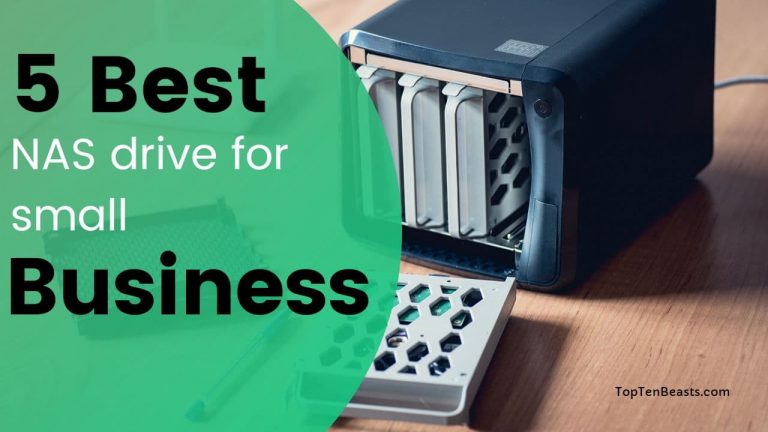If you are in search of the best NAS drive for small business, then you have landed at just the right place. NAS storage drives have become increasingly popular for small business. First, they offer a safe way to backup data, which is incredibly important for everyone from casual users all the way up to businesses with sensitive information that requires regular backups in case of any system failures or malicious attacks by hackers who might try and steal this precious data.
Furthermore, it’s often better (and sometimes even cheaper) if you opt NAS drive for small business instead of having external hard drives as your own little DIY project because these pre-made systems come packed with features like multiple drive bays so that you can add more space at will whenever necessary without doing much customization work on computer hardware components.
Software installation procedures just plug them into each other via USB cables and turn them on for the best NAS experience.
Table of Contents
In Case You’re In A Hurry? Here Is Our Recommendation
Best nas drive Synology 2 DS220+
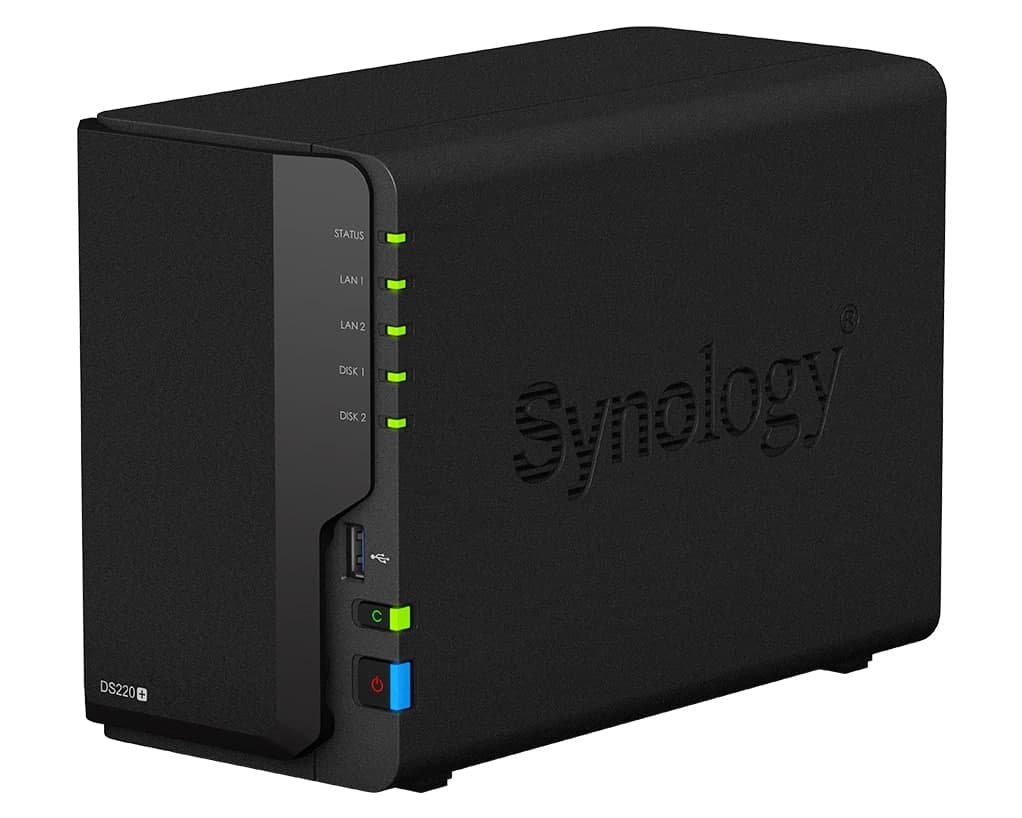
Why we recommend?
- Memory: 2GB DDR4 RAM (Expandable up to 6GB)
- Internal HDD/SSD: 2x 3.5 SATA II or 2.5 SATA II / III, up to 4TB each
- LAN: 1x RJ-45 Gigabit LAN Port
We highly recommend this one, as this is the best quality and convenient product for you. Our picks are based on rigorous research and unbiased review trust my recommendation and thank me later.
What are the best NAS drive for small business?
1. best overall – Synology 2 DS220+

The Synology disk station ds220 plus is a brilliant NAS enclosure for those looking to purchase their first NAS server or to save some money and stick with the Synology brand. The unit can be configured in a JBOD (Just a Bunch Of Disks) or RAID 0, 1, and 5.
It has a solid build, a user-friendly interface and it comes with all the features of its more expensive siblings. this includes its own backup software, an email server, and even cloud storage.
The device comes with 2x USB 3.0 ports for super-fast transfer speeds when connecting external devices such as Western Digital’s my passport ultra drives (which I recommend as the best external hard drives for mac).
It also comes with one Gigabit Ethernet for maximum performance of up to 100MB/s for LAN and 108MB/s for WAN-LAN throughput. The unit also comes with a variety of apps that allow you to download and install the software you need directly from Synology’s app center.
Features:
- CPU : dual-core 1.0GHz processor
- Memory: 2GB DDR4 RAM (Expandable up to 6GB)
- Internal HDD/SSD: 2x 3.5 SATA II or 2.5 SATA II / III, up to 4TB each
- LAN: 1x RJ-45 Gigabit LAN Port
- WAN: 1x RJ-45 Gigabit WAN Port, Support failover
- How much? $$$(Check on Amazon)
Pros
- Dual-core processor
- USB 3.0 support
- Synology’s great software and apps
Cons
- The unit only comes with two drive bays.
2. Best High end – Synology 4 DS920+
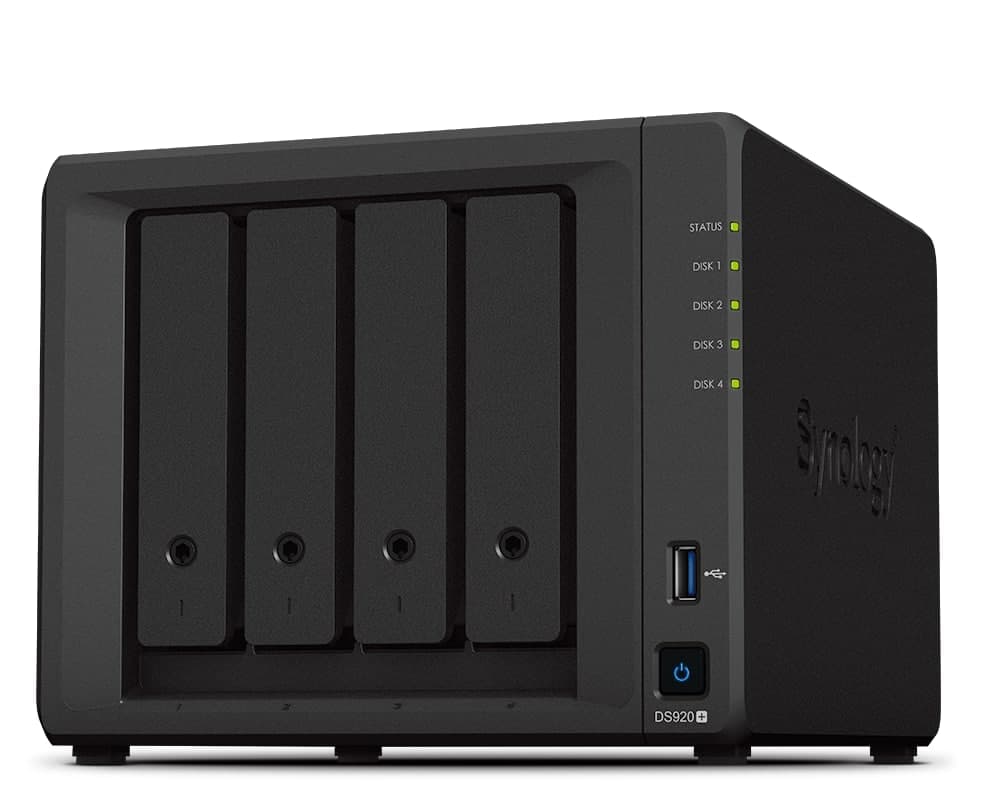
The ds920 plus is an affordable NAS for the power user capable of breezing through 4k video transcodes running virtual machines and more. It is a top-of-the-line NAS with ultra-high performance and the ability to run virtual systems allowing you to turn your NAS into a true personal cloud.
The Synology 4 -bay DiskStation DS920+ is equipped with an energy-efficient design that saves up to 35% of its total power capacity, making it one of the most eco-friendly NAS in its class.
It comes with 4GB of ram but is expandable up to 32GB, allowing for large files and applications to load quickly. The drive also features two Gigabit LAN ports that help improve data transfer speeds giving you the best networking performance even on larger file transfers.
The DS920+ uses an energy-efficient CPU and a PCIe expansion slot for boosting your file transfers without compromising speed, utilizing the Link Aggregation Technology (LACP) support of up to 4 x Gigabit LAN ports when used with a compatible switch.
Features:
- CPU : Quad Core 2.4GHz processor
- Hardware Encryption Engine & Virtualization support
- Memory: 4GB DDR4 RAM (Expandable up to 8GB)
- Internal HDD/SSD: 4x 3.5 SATA II or 2.5 SATA II / III HDD/SSDs, up to 16TB each
- LAN: 2x RJ-45 Gigabit LAN Ports
- WAN: 1x RJ-45 Gigabit WAN Port, Support failover
- How much? $$$(Check on Amazon)
Pros
- 64TB maximum capacity
- Rapid data transfer rates up to 226.94MB/s reading and 186.16MB/s writing over dual gigabit LAN for a single volume under Synology iSCSI storage protocol
- 4K Ultra HD video playback with HDR10 / AES-NI hardware-accelerated encryption engine
- Link Aggregation support for improved throughput
Cons
- Failure to install an expansion card will cause a decrease in performance.
3. Best for home – Asustor AS5202T
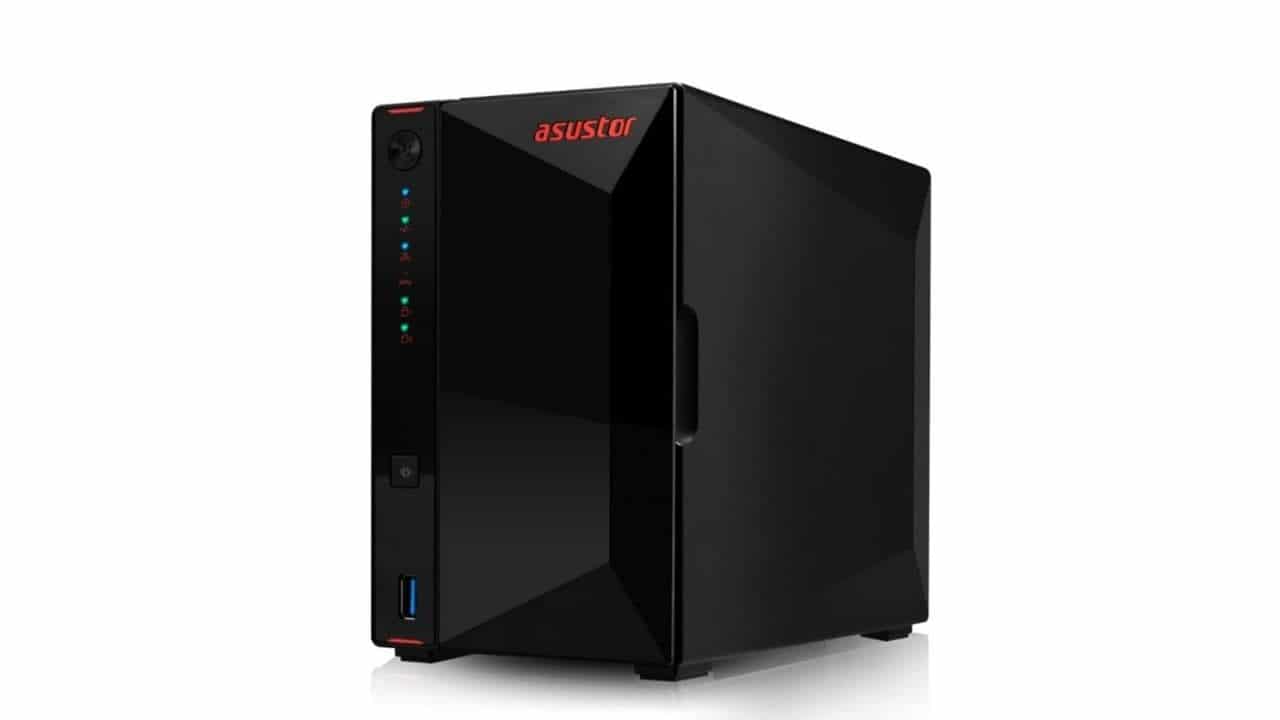
The Asustor AS5202T is a great 2-bay NAS drive enclosure that offers excellent performance and high reliability for mainstream consumers.
It comes with a quad-core 1.7GHz CPU, 4GB of DDR3 RAM (which can be expanded up to 8GB), dual LAN ports with failover support to ensure your data is always accessible.
The AS5202T comes with Android and iOS apps that allow you to access your data anywhere anytime and also act as a multimedia streaming server for all your entertainment needs.
It also has apps like Plex media server, DLNA, iTunes server, Photo Station, and more so sharing content between devices is super easy.
Features:
- CPU : Intel Quad-core 1.7GHz processor
- Hardware Encryption Engine
- Memory: 4GB DDR3 RAM (Expandable up to 8GB)
- Internal HDD/SSD: 2x 3.5 SATA II or 2.5 SATA II / III, up to 16TB each
- LAN: 2x Gigabit LAN Ports
- WAN: 1x Gigabit WAN Port
- How much? $$$(Check on Amazon)
Pros
- 2-bay NAS drive enclosure
- Plex Media Server support
- DLNA compliant devices support
- iTunes server for streaming music to Apple products
Cons
- The unit can only be expanded up to 32TB.
4. Best budget – TERRAMASTER F2-210
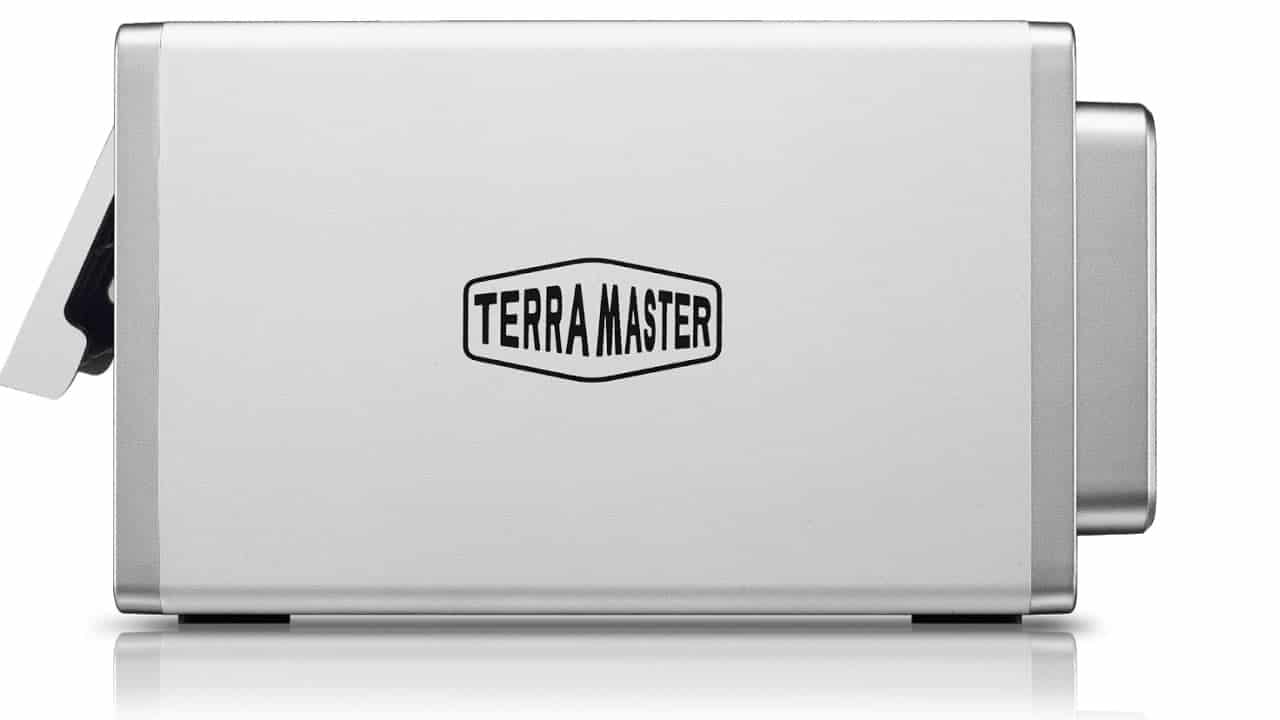
The TerraMaster F2-210 is a great NAS drive enclosure that offers excellent performance.
It comes with a low energy consumption AMD dual-core 2.4GHz processor, plus 4GB of DDR3 RAM, and two Gigabit LAN ports. The best part about this NAS drive is the built-in 10GbE connector which allows you to expand your network connection up to a 10GbE network.
This allows for fast and reliable data transfers speeds of up to 1,179 MB/s read and write.
The best part about the F2-210 is that it runs quietly, making this NAS drive enclosure best suited for small business IT environments because noise doesn’t distract your attention from your work.
If you are looking for the best NAS drive enclosure with 10GbE connectivity then this is the best option in the market.
Features:
- CPU : AMD GX-420MC Dual Core 2.4GHz processor
- Hardware Encryption Engine & Virtualization support
- Memory: 4GB DDR3 RAM (Expandable up to 8GB)
- Internal HDD/SSD: 2x 3.5 SATA II or 2.5 SATA II / III HDD/SSDs, up to 20TB each
- LAN: 2x Gigabit LAN Ports
- WAN: 1x Gigabit WAN Port
- How much? $$$(Check on Amazon)
Pros
- 10GbE connectivity option best suited for small business IT environments
- Low power consumption CPU best suited for NAS drive enclosure
- Automatically backup business data using RTRR, Rsync, FTP , CIFS/SMB protocol
- Run quiet making it best suited for a small business IT environment
Cons
- A bit expensive than the other best NAS drive
5. best for server – QNAP TS-231P3
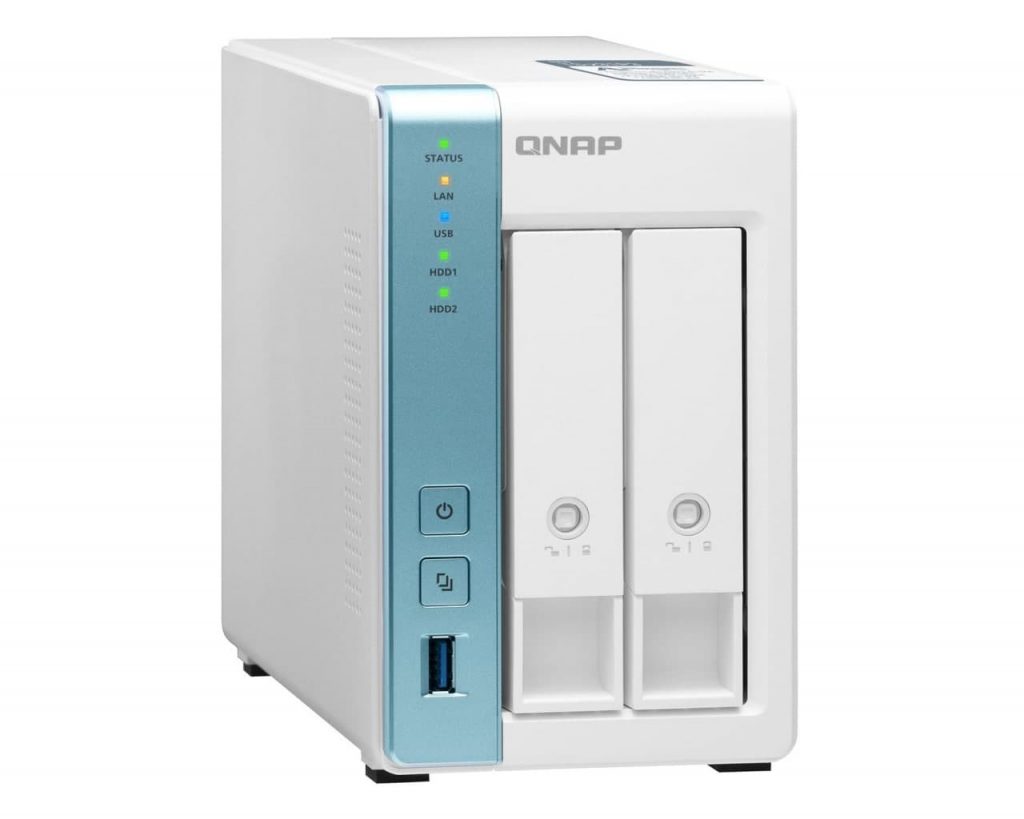
The QNAP TS-231P3 is the best NAS drive enclosure that offers excellent performance, high reliability for mainstream consumers. It comes with an ARM dual-core 1.6GHz processor, 2GB of DDR3 RAM (can be expanded up to 4GB), and two built-in Gigabit Ethernet ports.
The best part about the QNAP TS-231P3 is that it comes with multiple features like a PLEX media server, DLNA server, iTunes server for streaming music to Apple products.
It also has apps like Virtualization Station, which allows you to run other operating systems from your NAS drive enclosure, and Office which gives you a great office experience on your NAS drive.
Features:
- CPU : ARM Cortex-A9 Dual Core 1.6GHz processor
- Hardware Encryption Engine
- Memory: 2GB DDR3L RAM (Expandable up to 4GB)
- Internal HDD/SSD: 2x 3.5 SATA II or 2.5 SATA II / III, up to 16TB each
- LAN: 2x Gigabit LAN Ports
- WAN: 1x Gigabit WAN Port
- How much? $$$(Check on Amazon)
Pros
- Affordable best NAS drive in the market with great features best suited for small business IT environments
- Virtualization Station best suited for best NAS drive enclosure
- Plex Media Server best suited for best NAS drive
- DLNA compliant devices best suited for best NAS drive
Cons
- Not suitable for high-performance NAS needs.
All these 5 best NAS drives are suitable for small business environments because they offer great features and a reasonable price range. They have been the best NAS drive options for small businesses.
Also read: 5 Best Toaster For Tall Bread 2022
What to consider before buying nas drive for small business?
1. Network connection: Wired or wireless?
While the wireless connection is best for home use where there are not too many restrictions on signal reach, in business, it’s best to go with wired Ethernet connections. You wouldn’t want your NAS drive to behave erratically because of signal interference.
2. Storage space: What kinds of files will you store?
Audio, video, image, text files? If they are very large then you best opt for a more powerful NAS drive with 4-8 HDD bays, but if you’ll be using it for the majority of your business work, best to go with 2 or 3 bays.
3. How many people/computers will connect to NAS at once?
More than one person may need to access the drives simultaneously.
For example, this would be a problem if you have a wireless NAS drive and your employees are in different locations.
4. What kind of backup software does the device have?
Some options allow for cloud storage (i.e., Dropbox) or network drives to be backed up, but others don’t. This is another thing that you should consider before buying a NAS drive for a small business.
5. Which RAID configuration will fit your needs?
Not all NAS drives offer multiple RAID options, but if you need a system with RAID for extra security and backups, then this is something to consider as well before buying a NAS drive for a small business.
6. What other features does the drive have?
While NAS drives are typically simple in nature, many now have some sort of cloud storage that allows your business to back up files remotely. There are even options with email servers built-in for a small business!
7. How much does the device cost?
Most people don’t want to spend more than they need on a system, but it’s also important to make sure you get a reliable drive.
8. What kind of warranty does the device have?
Most NAS drives come with a standard one-year warranty, but some have extended plans that are better suited for businesses that need extra protection in case something goes wrong with their system.
NAS vs External Drive: What’s Best For You?
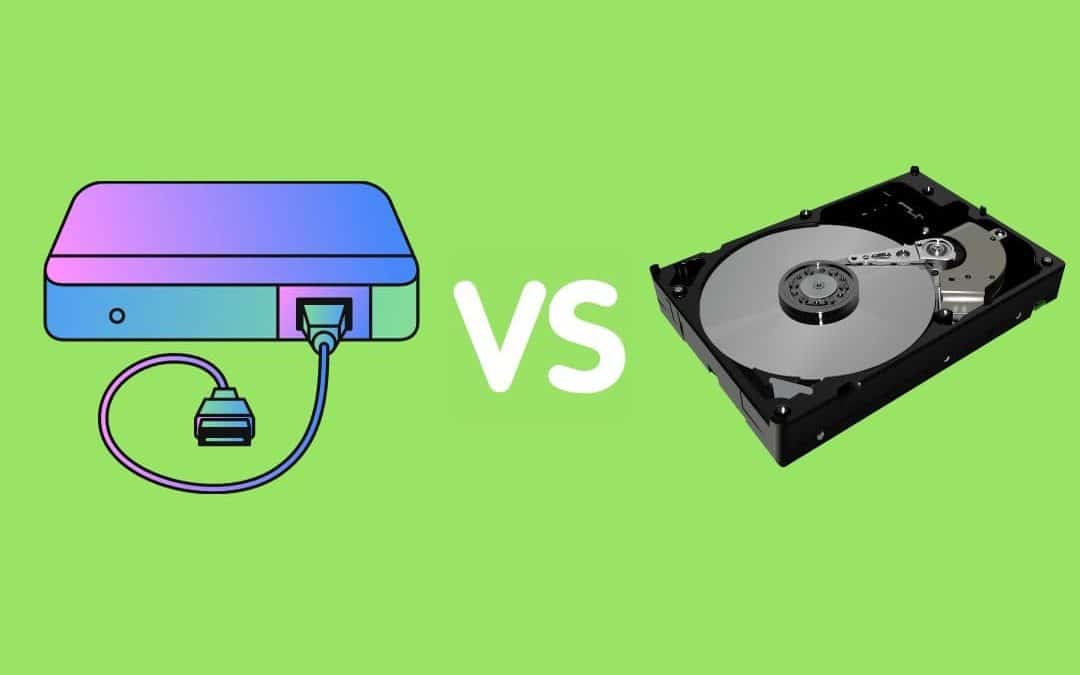
Number of computers accessing data simultaneously
- External drive: One computer can access the stored data at a time.
- NAS: Multiple computers can use the NAS as a server to access and edit the same set of data simultaneously.
Storing and sharing large files and folders
- External Drive: It has limited storage capacity (usually between 500GB to 1TB). The file size cannot be more than 4GB.
- NAS: Multiple users can access the NAS with large data storage capacity (usually between 1TB to 16TB). Files as big as 20GB can be stored on the NAS.
Speed
- External Drive: External drives are slower in comparison to NAS. Writing and reading time is comparatively higher for external drives.
- NAS: NAS is faster than an external drive. It writes and reads data at a much higher speed.
Backup and restoration of data
- External Drive: One has to manually save the backup on the external hard disk for future use or restoration. Backing up data on an external drive requires plugging in the device into the system which can lead to data loss or corruption.
- NAS: Automatic backup and restoration of data is possible with a NAS drive. It can store multiple backup copies for each file and folder in the system as well as on other devices on the network. Even if one copy gets lost, there are chances that the other copies stored on other drives will be safe and intact.
Budget
- External Drive: External hard drives are cheaper in comparison to NAS. They have a lesser upfront cost.
- NAS: NAS has an upfront cost for the purchase of the product and the necessary hardware components. However, it charges monthly or per annum fees to use its features that you would otherwise have to pay if you were using an external hard drive.
FAQ for best NAS drive for small business:
Can you use a NAS hard drive in a desktop computer?
Can I use a NAS drive in a laptop?
Can I use a NAS drive in my car?
What is best configuration of PC for NAS?
What are the benefits of NAS as compared to cloud storage?
Verdict
We hope this article has helped you to better understand the best NAS drives for your small business. If you want even more detailed information about how these devices work, or if you’re ready to purchase one of them, we’ve linked out to some helpful resources for the best NAS drives mentioned above that will walk through all the features and answer any questions you might have with buying a new NAS device. Let us know which drive is right for your needs! And as always, feel free to reach out with comments or questions.
